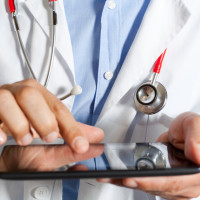It’s not always easy to manage your own healthcare or that of a loved one. Between doctors’ appointments, lab and test results, and keeping track of prescription medications new and old, caring for your own health or that of a loved one can become overwhelming. But, just as technology is making all other aspects of our modern lives easier, it’s making this aspect of our lives easier too.
EHealth software can make juggling your healthcare responsibilities easier by helping you establish and maintain a personal health record (PHR). With the help of software or an app, you can create a detailed record of your own or a loved one’s health information that will allow you, and others involved in yours or your loved one’s care, to access the information they need when they need it, quickly and easily. Your PHR can become a valuable tool to help you maintain control over your own healthcare decisions, or those of a loved one who depends on you.
Simplify Your Medical Records
The biggest advantage of establishing a PHR is that it puts all of your medical records and crucial information in one place and in one easily navigable format. Instead of flipping through pages and pages of medical information written out the old-fashioned way, you’ll be able to quickly search through your medical history to find the information you need. Your PHR will serve as a complement to the medical records your providers are already maintaining about you. It will let you easily share your medical information with family members and caregivers who need it.
EHealth apps and software platforms often make things simpler and easier to manage by automatically backing up information to a secure cloud-based storage system, so that you don’t have to worry about losing your information. With one of these cloud-based systems, you or a designated advocate will be able to retrieve your information from any device.
Build Your PHR
Some people choose to maintain a PHR in an Excel spreadsheet or Word document that can be digitally stored and shared on a USB drive. However, these documents can become unwieldy, especially as your medical information becomes more expansive. A better option is to choose one of the many home healthcare software options available. A software program or app designed to help you create a PHR may allow you to compile information that you may want your healthcare providers to have access to, such as data about your sleep patterns or exercise habits, use of vitamins or over-the-counter medications, or family medical history.
These software platforms typically include tools to help you enter and update health information, monitor use of medications, and even track test results, insurance payments, and more. Many programs and apps include a Web portal that could allow you to contact your doctor with questions, schedule appointments, or refill prescriptions.
Help a Loved One
If you’re caring for a loved one, a PHR can be invaluable for helping you keep track of that person’s needs. It’s hard enough staying on top of your own care needs sometimes, not to mention keeping another person’s allergies, medication schedules, emergency contact information, and medical history straight.
A PHR allows you to keep track of an elderly parent’s or child’s medical information so that you can make sure he or she gets the medication he or she needs at the right times, makes it to his or her doctors’ appointments, and avoids potentially deadly allergens and other hazards. Some other common features might allow you to track blood pressure or blood glucose levels, access immunization records, and provide identifying information to make sure that home caregivers or emergency personnel who need to use the PHR are accessing the right information for the person they’re treating.
Whether you’re looking for a way to better manage your own healthcare, or need help balancing a loved one’s care, a PHR could be the answer. A PHR provides an electronic record of a person’s health history, medications, allergies, and other important data that you build and maintain yourself; it works alongside a physician’s electronic health record (EHR) to make sure that all caregivers and emergency personnel are on the same page. The information you collect in your PHR — or that of a loved one in your care — could make all the difference when it comes to yours or their health outcome, so take it seriously and make sure it is complete and up to date.
